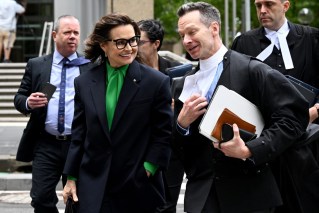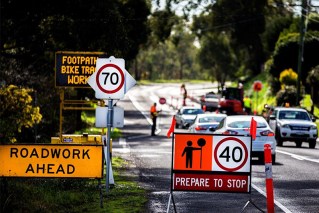In a race to the bottom, government’s sneaky hand-brake on housing makes perfect sense
Widely criticised since its announcement earlier this month, the state government’s plan to calculate land tax liabilities across state lines is a clever way to slow down the housing market, writes Michael Pascoe.


Former Premier Sir Joh Bjelke-Petersen. (ABC photo)
It’s 44 years since Joh Bjelke-Petersen dropped death duties in Queensland, starting a quick race to the bottom by other states and destroying a valuable plank in our tax system.
But now Queensland is going a small way towards making amends by opening the door for states to rationally calculate and collect land tax on a national basis – if they’re smart enough to seize the opportunity.
The usual suspects in the property industry are already screaming blue murder – alleging the end of rental properties in Queensland, claiming it’s evil double taxation, forecasting the earth will split asunder and issue forth toads and serpents and so on.
What they fear is that other states might know a good idea when they see one and follow suit – if they are not politically owned by the landlord class.
At present, it is possible for property investors to minimise or totally avoid paying land tax by spreading their portfolio around different states.
For example, canny Individual A might own three investment units, each with land value of $400,000, in three different states, thereby coming in under the land tax threshold in each jurisdiction.
If Landlord B owns three investment units, each with land value of $400,000, in one state, he or she will be liable for land tax on the total $1.2 million value. If those three are in Queensland, the land tax would be $7800 a year.
Contrary to some of the scaremongering, Queensland is not going to tax its citizens on what they own interstate, but from next financial year it will count the value of interstate investment properties in calculating what tax should be paid on the Queensland property, as the Queensland Treasury has explained.
In the example I’ve used, Landlord A will be up for tax on the Queensland proportion of the $1.2 million: one-third of the $7800 being $2600 a year. That’s still less than if all the properties were in Queensland, but more than the zero tax paid this year.
Bjelke-Petersen sold his tax destruction with the line that it would encourage rich people to move to Queensland to avoid death duties – “Queensland, a great place to die”.
When his move was copied, there was no advantage for Queensland but a loss for all states from their tax toolkit.
In reverse, if other states follow the Queensland initiative, Queensland will lose nothing and all state treasuries will gain.
Obviously the new system would work better on a national, co-ordinated basis. For now, it seems Queensland might be relying on the goodwill of other states’ Titles Offices to keep its citizens honest.
Once upon a time, speeding fines incurred in other states did not count towards the penalty points on a driver’s licence in the state that issued the licence.
That was pretty silly and changed when media highlighted examples of truck drivers running up multiple infringements interstate without endangering their licence.
The Queensland land tax change could be a bit like that initiative, a more rational, national approach to a state tax.
And, as the Reserve Bank governor underlined on Friday and every credible tax expert has been saying for decades, we need a more rational, national approach to tax.
RBA governor Philip Lowe has long been advocating a national approach to tax.
As it stands, the Queensland initiative is small beer, yet an Australian National University study paper has calculated that a federal land tax of just 0.1 per cent would pretty much take care of the half-a-trillion-dollar debt run up fighting Covid-19.
A sensible land tax, like sensible death duties, would mainly impact the wealth of wealthier people. At present, wealth is treated very kindly by our tax system.
The aggregation of serious wealth tends to be taxed more lightly than the income of ordinary people, as serious money is mainly made by way of capital gains which the tax man discounts by half, never mind the labyrinth of trusts, tax havens and inventive accountants and lawyers used by the seriously rich.
Among the good things about taxing land is that it can’t be moved, and the rich tend to own more and the most expensive land, so it is naturally progressive.
Four decades of neoliberalism/Reaganomics/Thatcherism/whatever-euphemism-you-prefer-for-trickle-down-economics has reduced the tax burden on the rich, enriched capital and suppressed labour.
Having won so much privilege and so pervasively infiltrated policy formation, the trickle-downers are powerful and hard to displace.
There are seriously rich people who believe seriously rich people should be paying more tax, but they self-evidently aren’t the ones with the power.













